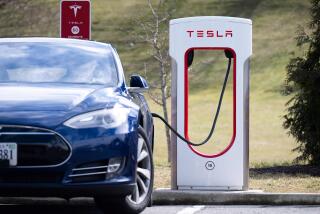‘Cash for clunkers’ plan added to energy bill
- Share via
WASHINGTON — President Obama and key House Democrats agreed Tuesday to include a “cash for clunkers” program in the major energy bill being written in Congress, but they ended a White House meeting without reaching agreement on thornier issues -- including how to reduce the economic impact of curbing greenhouse gas emissions.
The “clunkers” program would offer federal payments to consumers who scrapped older gas-guzzling vehicles and bought new, more environmentally friendly ones to replace them. Similar programs have enjoyed some success in Europe.
Rep. John D. Dingell (D-Mich.), a longtime champion of the auto industry, said the plan would “result in hundreds of thousands of new vehicles being purchased across the country.”
Members of the House Energy and Commerce Committee, which is drafting the energy bill, hailed the agreement on a clunkers program as a sign that the larger points of contention could be resolved, including the sweeping plan for limiting the greenhouse gas emissions that scientists blame for global warming.
Obama and some Democrats in Congress want to set limits on carbon emissions and require power plants and other emitters to obtain permits. But purchasing permits would raise costs and prices, a sensitive issue in the industrial heartland and in states that are large coal and petroleum producers.
Several Democrats from states that produce fossil fuels or depend on manufacturing have pushed for concessions, relaxing emissions targets or giving out some free permits instead of auctioning them as Obama’s budget proposes.
Reaching agreement on exactly how much relief to grant may be the key to whether a major climate program clears Congress this year.
Committee members said Obama told them he wanted quick action on the bill and would give them wide latitude to work out the details, an apparent signal he’s willing to compromise.
“He wants legislation,” committee Chairman Henry A. Waxman (D-Beverly Hills) told reporters after the meeting. “He wants us to move as quickly as possible.”
Energy subcommittee Chairman Edward J. Markey (D-Mass.) said the president and committee Democrats were committed to resolve the issues “in a way that bridges . . . regional issues.”
--
More to Read
Get the L.A. Times Politics newsletter
Deeply reported insights into legislation, politics and policy from Sacramento, Washington and beyond. In your inbox twice per week.
You may occasionally receive promotional content from the Los Angeles Times.










